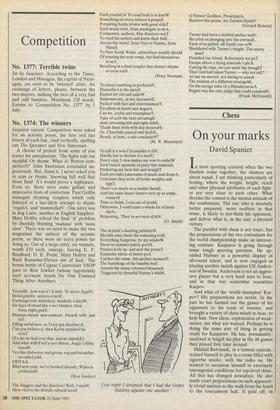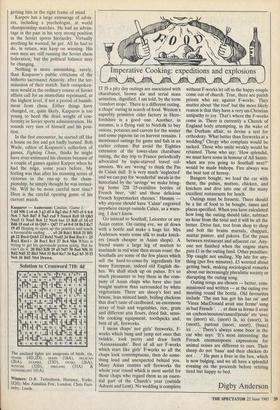Chess
On your marks
David Spanier
In most sporting contests when the two finalists come together, the chances are about equal. I am thinking particularly of boxing, where the weight, height, reach and other physical attributes of each fight- er are very close to each other. What decides the contest is the mental attitude of the combatants. The one who is mentally better prepared, more resilient in that sense, is likely to out-think his opponent, and deliver what is, in the end, a physical victory.
The parallel with chess is not exact, but the preparations of the two contestants for the world championship make an interest- ing contrast. Kasparov is going through some tough sparring partners. He up- ended Hubner in a powerful display of all-round talent, and is now engaged in playing another match against Ulf Anders- son of Sweden. Andersson is not an aggres- sive player but a very hard man to beat, and in that way somewhat resembles Karpov.
And what of the `world champion' Kar- pov? His preparations are secret. In the past he has farmed out the games of his opponent to his team of trusties, and brought a variety of chess minds to bear, to help him. New ideas, exploitation of weak- nesses, are what are wanted. Perhaps he is doing the same sort of thing in getting ready for Kasparov. He has, presumably, analysed at length his play in the 48 games they played first time around.
Mikhail Boo, innik, in a famous episode, trained himself to play in a room filled with cigarette smoke, with the radio on. He wanted to accustom himself to extremely uncongenial conditions for top-level chess. All that has changed nowadays. He also made exact preparations on such apparent- ly trivial matters as the walk from the hotel to the tournament hall. It paid off, in
getting him in the right frame of mind.
Karpov has a large entourage of advis- ers, including a psychologist, at world championship matches. He had an advan- tage in the past in his very strong position in the Soviet sports hierarchy. Virtually anything he wanted, he got. All he had to do, in return, was keep on winning. His own men are still running the Soviet chess federation, but the political balance may be changing.
Nothing is more astonishing, surely, than Kasparov's public criticisms of the hitherto sacrosanct Anatoly, after the ter- mination of their match. Such outspoken- ness would in the ordinary course of Soviet affairs call for an immediate reprimand, at the highest level, if not a period of banish- ment from chess. Either things have changed, or, quite likely, Kasparov is too young to heed the dead weight of con- formity in Soviet sports administration. He sounds very sure of himself and his posi- tion.
In the first encounter, he started off like a house on fire and got badly burned. Bob Wade, editor of Kasparov's collection of games, Fighting Chess, thinks he might have over-estimated his chances because of a couple of games against Karpov when he had the edge, some years before. My feeling was that after his stunning series of victories in the run-up to the cham- pionship, he simply thought he was invinci- ble. Will he be more careful next time? Here is the careful opening game of his current match.
Kasparov — Andersson: Catalan, Game 1.
1 d4 Nf6 2 c4 e6 3 g3 d5 4 Bg2 dxc 5 NO c5 6 0-0 Nc6 7 Ne5 Bd7 8 Na3 cxd 9 Naxc4 Rc8 10 Qb3 Nxe5 11 Nxe5 Bc6 12 Nxc6 bxc 13 Rd! c5 14 e3 Bd6 15 exd c4 16 Qb5+ Qd7 17 a4 0-0 18 Be3 Rc7 19 d5 Hoping to open up the position and reach a favourable ending . . . e5 20 Rdcl Rfc8 21 Bfl g6 22 Bxc4 Qxb5 23 Bxb5 NxdS 24 Bab Rxcl+ 25 Rxcl Rxcl+ 26 Bxcl BO 27 Bc4 Nb6 White is trying to get his quecnside pawns going. But he can't do it. 28 Bb3 Kf8 29 a5 Nd7 30 Ba4 Nf6 31 Bd2 Nd5 32 Bb3 NM 33 Bc4 Ke7 34 Kg2 h5 35 f3 Nc6 36 Bd5 NM Drawn.















































 Previous page
Previous page